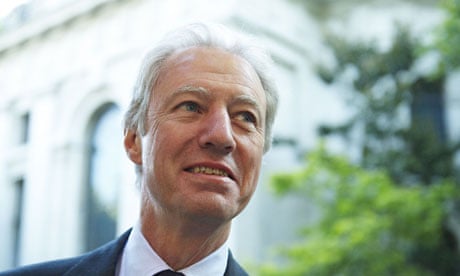Marcus Agius, the chairman of Barclays, is resigning in a move intended to take some of the pressure off the embattled bank's chief executive, Bob Diamond, who has faced calls to quit following the interest rate fixing scandal.
Amid growing political pressure for a top-level departure – and a weekend of high drama during which the bank insisted on Saturday that Agius had no plans to go – the chairman's departure is expected to be announced with an apology. Agius is expected to say he is "truly sorry" for the interest rate rigging fine which "let down" customers and employees.
He is likely to stay on while a full-time successor is found, as the Financial Services Authority, the City's regulator, would need to approve the position.
Existing board member and former Cadbury boss Sir John Sunderland is expected to lead the search for a full-time successor. Sir Michael Rake, a former top accountant and senior independent director on the bank's board, is regarded as the front-runner, but he has numerous other commitments which could prevent him taking on the role, even temporarily.
The boardroom reshuffle comes as Barclays gears up for Diamond's appearance before MPs on the Treasury select committee on Wednesday. The American-born chief executive is expected to face tough questions about what changes have been made at the bank since it was landed with a record £290m fine last week.
The fine, and the embarrassing emails disclosing the way traders attempted to manipulate the interest rates with offers of bottles of Bollinger champagne, unleashed a wave of political fury – which will intensify when MPs hold their hearings on Wednesday and Thursday.
While Diamond is expected to make clear to MPs that Barclays was not alone in the practices – which dated back as far as 2005 – the decision by the bank to settle with the regulators in the City and in the US has put it in the spotlight. He is likely to be questioned about conversations he had with the Bank of England at the time.
The MPs are expected to ask Agius to attend – along with non-executives of the bank – even though he will be stepping aside.
Agius, who is also expected to resign as chairman of the industry lobby group, the British Bankers' Association, has had a frosty relationship with shareholders for much of his tenure and had been under some pressure even before the news of attempts to manipulate crucial interest rates.
The bank will be hoping that the departure of Agius takes some of the political heat of the scandal, which led to the prime minister calling for accountability at the top.
But Lord Oakeshott, the Liberal Democrat peer, kept up the pressure: "Marcus Agius going and Bob Diamond staying would be no solution to this scandal. Diamond is the driver and Agius the passenger in the Barclays car crash."
This view is not shared by investors because, despite the political clamour for Diamond's departure, shareholders are not keen for him to leave as there is no obvious successor and his strategy for the bank largely has investors' support.
The controversial relationship between Agius and shareholders dates back to 2008, when the bank turned to Middle Eastern investors to raise capital and then came in for criticism after the revolt over Diamond's £17m pay at the annual meeting in May.
That left him vulnerable to further criticism in the light of the revelations about attempts to fix interest rates, known as the London interbank offered rate (Libor) and the European equivalent, Euribor.
These are two benchmarks that are the basis for pricing an array of financial products, potentially affecting the price at which households and businesses borrow money.
The Financial Services Authority fined the bank £59.9m, while in the US the Department of Justice and the Commodities Futures Trading Commission also imposed fines, some £230m combined.
From 2005 the Barclays traders are said to have tried to alter rates to help themselves and rival traders, while in 2008 – when Barclays raised concerns about Libor – the bank is said to have kept rates lower because higher levels might have been misinterpreted as suggesting the bank was facing financial difficulties.
At one point, the documents released by the FSA showed that so-called submitters of the rates used to calculate Libor believed they were operating under the instruction of the Bank of England.
Paul Tucker, deputy governor of the Bank of England, spoke to Diamond at the time and the Barclays boss is likely to be asked about the detail of this conversation when he appears before MPs.
The Bank of England made clear last night that it did not know about the problems with Libor at the time.
"It is nonsense to suggest that the Bank of England was aware of any impropriety in the setting of Libor. If we had been aware of any attempts to manipulate Libor we would have treated them very seriously," the Bank said.
Until this weekend, Barclays' board had felt that it had taken tough action in the aftermath of the fine. Diamond forfeited his bonus for 2012, as have his close colleagues Jerry del Missier and Rich Ricci as well as the finance director, Chris Lucas.
Shareholders, though, want to claw back bonuses from prior years and are concerned about the impact of political intervention, which has already contributed to a £4bn slump in the company's value in just 72 hours.
